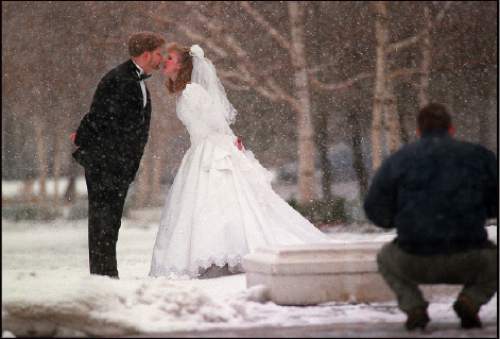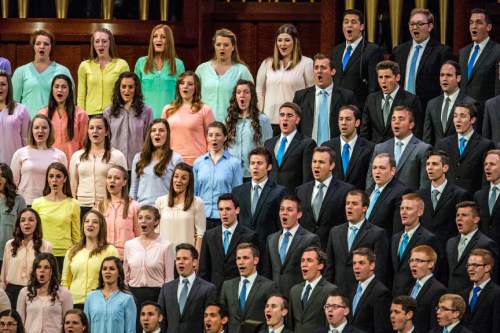This is an archived article that was published on sltrib.com in 2015, and information in the article may be outdated. It is provided only for personal research purposes and may not be reprinted.
In Utah, there are 150 LDS women for every 100 Mormon men — and that's causing a problem for a faith in which heterosexual marriage is among its highest values.
These are the statistics writer Jon Birger cites this week in a Time magazine article, titled, "What Two Religions Tell Us About the Modern Dating Crisis."
Birger gets his LDS data from Trinity College's American Religious Identification Survey (ARIS) on the demographics of Mormons, which substantiates the 50 percent oversupply of women.
"You have no idea how big a problem this is," Tristen Ure Hunt, founder of Mormon Matchmaker, a Salt Lake City dating agency, says in the Time piece.
Hunt, a 35-year-old who only recently got married herself, told Birger "she has three times more single women than single men in her matchmaking database."
The Time writer notes a similar demographic issue among Orthodox Jews, who refer to the "excess of unmarried women in their communities as the Shidduch Crisis."
Shidduch, he says, is the "Hebrew word for a marriage match."
In the past two decades, the Utah-based Church of Jesus Christ of Latter-day Saints has seen its gender gap "widen dramatically," Birger writes, "from a gender ratio of 52:48 female to male in 1990 to 60:40 female to male in 2008, according to a study co-written by ARIS researchers Rick Phillips, Ryan Cragun and Barry Kosmin."
He mentions a 2013 Salt Lake Tribune story, which reported that Parley's LDS Seventh Ward, one of Salt Lake City's congregations for singles between ages 31 and 45, "had 429 women on its rolls in 2013 versus only 264 men."
By lowering the missionary ages in 2012, the number of missionaries soared from 58,000 to nearly 90,000, which "should reduce the Mormon gender gap and ease the Mormon marriage crisis over time," he writes. That, however, will not help "today's single Mormon women."
A 33-year-old single Mormon named Stephanie, writing at Patheos, agrees.
Looking at the article's county-by-county map of the United States, she discovered that in Davis County, where she lives, the lopsided ratio is even greater — "single women outnumber single men two to one."
And Stephanie's experience supports that.
"For the past two months, my roommate and I have attended a mid-singles ward in Bountiful — ages 31 to 45. Our second week there, we went to a new member meeting in which we were told that about 450 people attend sacrament meeting in the ward each week, on average," the essay says. "I don't know how many of those 450 are women and how many are men, but it wouldn't be surprising to hear the 2:1 ratio cited again in this case."
And thus, Stephanie says, "the problem at hand every Sunday is that you as a female in a singles ward around here have to put on a show to get any attention from any of the menfolk. ... Anywhere you might go to try and meet a fellow Mormon of the opposite sex, there will always be more of you than there are of them. It is hard to enjoy yourself at an activity or feel particularly edified in sacrament meeting if your constant feeling while there is one of competition with the other girls around you."
Stephanie isn't surprised by female friends who have chosen to marry outside the faith, or simply drop out altogether. That hasn't been her path — yet.
"Though I can promise you I have no plan to marry outside the church," she writes. "I may not have a plan to marry inside it either.
Mormon historian Ardis E. Parshall doesn't go to church services to find a mate, she says, but would like to hear more about how LDS beliefs can be better applied to the faith's growing single population.
"Marriage and the nuclear family are such fundamental assumptions of Mormonism, they are so basic to the day-to-day identity of members and expectations of leaders that nobody seems to notice the needs of the extraordinary one," Parshall writes on her blog, Keepapitchinin, " — the never married, the widowed, the divorced, the childless, the Latter-day Saint with some other peculiar family situation — who has fallen in their midst, even when that exotic being is struggling, maybe even drowning, right under their noses."
The "pervasive assumption of marriage," she writes, "reveals itself every time a class on any other topic devolves into a discussion of how to teach that topic to children; every time a sacrament meeting speaker's talk devolves into a narrative of 'how I met my wife'; every time a speaker casually throws out the line 'this applies to singles, too' without the slightest indication of how such a thing can be implemented by singles (my prime example of this is when three speakers tossed out that line in a ward meeting devoted to Family Home Evening); every time a speaker repeats the bit about 'no blessing will be withheld in the eternities' and then continues under the assumption that he has adequately dealt with the needs of single members."
Absence of marriage and family "is not evidence of divine disfavor," Parshall argues. "Marriage may be superior to singleness; married people are not superior to single people."
The Salt Lake City researcher is not asking her church to change its focus and emphasis on marriage, just find themes in the discussion that apply to others as well.
"I don't mind at all that the church stresses marriage and family, and I don't really mind ... having my worship time hijacked, as it was yesterday, by speakers who lectured me on the importance of spouses cuddling for 45 minutes every day, and going on dates together and daily couples prayers," she writes. "But I, as a single woman, need counsel on living my life, too, with my peculiar needs: If cuddling is so important to mortality that it becomes the subject of sacrament meeting discussion, then how does a single woman supply that lack within the bounds of the gospel? If intimate companionship is so important that a weekly date with your spouse is counsel from the pulpit, then how can a single woman fill the gap? If prayer as a couple is important, then what does a single woman do without the support of a husband with whom to pray?"
Again, she doesn't expect weekly church attendance to satisfy her social needs.
"I don't need amusement," Parshall writes. "I need answers, and counsel, and guidance on making the most of mortality within the realities of a singular life."
Peggy Fletcher Stack





